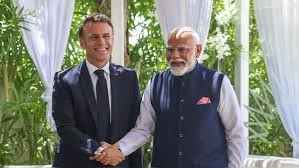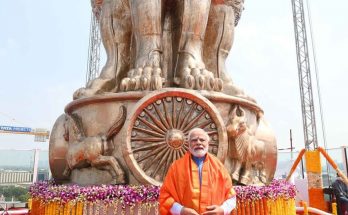
When I addressed the United Nations General Assembly for the first time in my present capacity in 2015, I spoke of the need for a transformative change, which can reinvigorate the nation and enable it to play its rightful role in international affairs, while also becoming the fastest growing major economy in the world. In the past four and a half years, this comprehensive and energetic renewal of India’s global engagement has been founded on the motto of Sabka Saath, Sabka Vikas – an emphasis on the welfare of all.There are five key elements of this approach, which I would like to mention here, without going into too much details.First, we have rebuilt India’s bridges, both literally and figuratively speaking, with its immediate and extended neighbourhood. We have devoted a much higher level of resources and attention to our neighbourhood, not only when it comes to formal diplomatic engagements but also in pushing next generation regional connectivity and critical infrastructure, and also at times of distress and need.In particular, Prime Minister’s strategic vision of SAGAR has spurred a qualitative transformation in India’s engagement with the Indian Ocean Region in recent years.
Our revitalised Act East and Think West paradigms have further broadened the reach of our strategic and economic ‘neighbourhood’. At the same time, our commitment to upholding territorial integrity and sovereignty remains unwavering. Our consistent message is that unresolved border issues can be resolved bilaterally, when approached in the right spirit and, in an atmosphere free from violence and hostility. Second, we are shaping our relationships in a manner that synchronises with India’s economic priorities. With this “diplomacy for development” approach, each global interaction is now focussed on building partnerships to promote our transformative flagship programmes such as Make in India, Smart Cities, Digital India, AMRUT and Namami Gange.Third, we are focussed on making India a human resource power to be reckoned with, by connecting our talented youth to global opportunities. This is being achieved through Skill India partnerships with several countries, as well as under the aegis of the GIAN programme and various private sector partnerships under Digital India. We have also made an unprecedented outreach to our Diaspora across the world, to tap into their skills, resources, and ideas.
All this is being done with the confidence that a prosperous, better connected and skilled young India will be the engine for growth and prosperity not only in South Asia but far beyond.Fourth, We are building sustainable development partnerships stretching from the Indian Ocean and Pacific Islands to the Caribbean, and from the continent of Africa to the Americas. These initiatives have expanded; both in geographical reach and sectoral coverage, and now include Lines of Credit and grants, technical consultancy, educational scholarships and a range of capacity-building programmes. Note that, we refer to these as partnerships, and not assistance.Our partnerships are consultative, non-reciprocal, and outcome oriented. We are of the firm belief that to be truly sustainable, such regional initiatives must be based on universally recognized international norms, good governance, openness, financial viability, and transparency. Finally, we are leading the way in re-configuring and re-invigorating global institutions and organizations. Whether it is by founding the International Solar Alliance, which will benefit our energy security and also combat climate change; or our active role in humanitarian and disaster relief operations in our neighbourhood; or our membership of key institutions of global governance – India is a proactive and constructive contributor to promoting and upholding global peace and security.With its unwavering belief in multilateralism, India speaks not just for itself, but also for the cause of justice, opportunity and prosperity around the world. For us, transformation is not just a domestic agenda, it is a global vision.The first, as I have said on several earlier occasions, is terrorism. Friends, there was a time when India would talk about terrorism, and it would be treated as a law and order issue on many global platforms. Today, no country, big or small, is immune from this existential threat, particularly, terrorism actively supported and sponsored by states. In this digital age, the challenge is even greater, with a greater vulnerability to radicalization.As far back as 1996, India proposed a draft Comprehensive Convention on International Terrorism we call it CCIT at the UN, it remains a draft to this day, because we cannot agree on a common definition. Ensuring zero-tolerance towards terrorism, and those who use it as an instrument of convenience, is the need of the hour. Another challenge is the threat of proliferation of weapons of mass destruction. This is one challenge that this Dialogue will be discussing.Developing and under-developed nations are the worst victims of climate change, with neither the capacity nor the resources to meet the crisis. We have risen to meet the challenge. India, in partnership with France launched the International Solar Alliance earlier this year with the participation of 120 countries.
Remarks by External Affairs Minister Sushma Swaraj at the 4th Raisina Dialogue,New Delhi
Author Profile
- India Writes Network (www.indiawrites.org) is an emerging think tank and a media-publishing company focused on international affairs & the India Story. Centre for Global India Insights is the research arm of India Writes Network. To subscribe to India and the World, write to editor@indiawrites.org. A venture of TGII Media Private Limited, a leading media, publishing and consultancy company, IWN has carved a niche for balanced and exhaustive reporting and analysis of international affairs. Eminent personalities, politicians, diplomats, authors, strategy gurus and news-makers have contributed to India Writes Network, as also “India and the World,” a magazine focused on global affairs.
Latest entries
 India and the WorldJune 26, 2025Operation Sindoor: India Sheds Restraint, Rediscovers Utility of Force
India and the WorldJune 26, 2025Operation Sindoor: India Sheds Restraint, Rediscovers Utility of Force India and the WorldJune 23, 2025BRICS summit in Rio to focus on Global South, local currency trade
India and the WorldJune 23, 2025BRICS summit in Rio to focus on Global South, local currency trade Africa InsightsJune 11, 2025New Opportunities in India-Japan Cooperation in Africa
Africa InsightsJune 11, 2025New Opportunities in India-Japan Cooperation in Africa India and the WorldMay 23, 2025Post-Operation Sindoor, India reminds Turkey, China of concerns and sensitivities
India and the WorldMay 23, 2025Post-Operation Sindoor, India reminds Turkey, China of concerns and sensitivities







